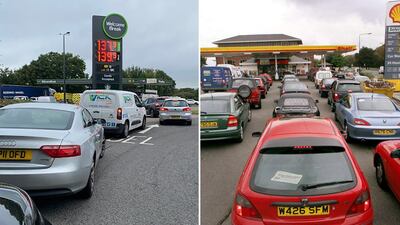Almost 21 years ago, I sat in the queue for fuel at Sarn Park services in Bridgend, South Wales as a petrol crisis hit Britain in the millennium year.
That day I was due to pick my parents up from the airport and needed to fill up.
There had been a genuine shortage of fuel – farmers and lorry drivers were blockading refineries in protest at fuel duties – and the crisis escalated as people panicked.
With an eerie sense of deja vu, I sat in a queue at the same filling station on Friday, wondering if I was going to be the unlucky one to reach the pump just after the last of the stocks ran dry.

I needed to return to London today – a 273-kilometre journey – and the quarter of a tank left was never going to make it. Waiting until later was not an option, as a sense of foreboding dawned.
The tailbacks mounted. When I joined there were around 12 cars in front of me. Within a few minutes I turned around to see cars and lorries stretching back, around a roundabout and back to the nearby dual carriageway.
Tempers frayed as motorists trying to leave the hotel and cafe could not get out.
An ambulance pushed through the traffic to the front of the queue. It caused a few quizzical looks, but even the most belligerent motorist would struggle to argue their need was greater.
A cement mixer that did the same got less sympathy, but he was a lot bigger than everyone else, so got away with it.
By the time I got to the front, there were three ambulances side by side. Concerned paramedics filled up their vehicles, worried that this sense of panic would cause a real drama later in the day.
When I did got to my turn, the pump took an age to register. I pressed the lever but nothing happened. Was this the moment? I felt the panic.
Then the flow of petrol kicked in and I felt a palpable sense of relief. The man in the car behind me also looked relieved.
When I went to pay, one woman was wondering aloud what on earth was going on. “What’s got into everyone,” she said, oblivious to the news that a shortage of drivers meant that some petrol stations would likely have to go without.

“It’s been like it all day,” said the cashier. “And town is even worse we’ve heard.”
Another woman was trying to pay for three buses that were fuelling. “We’ve been to get the fleet out and fill up or we might not be able to travel over the weekend,” she said.
My cashier was confident that they would not run out. “We’re a priority destination so we should get a refuel,” she said.
Another motorist I spoke to had given up. After passing three petrol stations – two that had run out of diesel and a third that had a queue so long he couldn’t bear the thought of joining – he was resigned to going without.
“I’ve only got 38 miles (61km) left in the tank, so I don’t want to drive around looking in case I run out,” he said.
“I’ll just have to walk this afternoon and leave the car at home over the weekend.”


